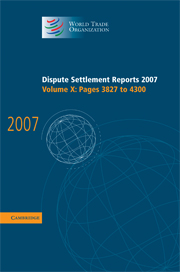Book contents
- Frontmatter
- Contents
- United States – Sunset Reviews of Anti-Dumping Measures on Oil Country Tubular Goods from Argentina – Recourse by Argentina to Article 21.5 of the Understanding on Rules and Procedures Governing the Settlement of Disputes (WT/DS268): Report of the Panel – Annexes C to F
- United States – Measures Relating to Zeroing and Sunset Reviews – Arbitration under Article 21.3(c) of the Understanding on Rules and Procedures Governing the Settlement of Disputes (WT/DS322): Report of the Arbitrator
- United States – Measures Affecting the Cross-Border Supply of Gambling and Betting Services – Recourse by the United States to Arbitration under Article 22.6 of the Understanding on Rules and Procedures Governing the Settlement of Disputes (WT/DS285): Decision by the Arbitrator
- Cumulative List of Published Disputes
United States – Sunset Reviews of Anti-Dumping Measures on Oil Country Tubular Goods from Argentina – Recourse by Argentina to Article 21.5 of the Understanding on Rules and Procedures Governing the Settlement of Disputes (WT/DS268): Report of the Panel – Annexes C to F
Published online by Cambridge University Press: 13 December 2017
- Frontmatter
- Contents
- United States – Sunset Reviews of Anti-Dumping Measures on Oil Country Tubular Goods from Argentina – Recourse by Argentina to Article 21.5 of the Understanding on Rules and Procedures Governing the Settlement of Disputes (WT/DS268): Report of the Panel – Annexes C to F
- United States – Measures Relating to Zeroing and Sunset Reviews – Arbitration under Article 21.3(c) of the Understanding on Rules and Procedures Governing the Settlement of Disputes (WT/DS322): Report of the Arbitrator
- United States – Measures Affecting the Cross-Border Supply of Gambling and Betting Services – Recourse by the United States to Arbitration under Article 22.6 of the Understanding on Rules and Procedures Governing the Settlement of Disputes (WT/DS285): Decision by the Arbitrator
- Cumulative List of Published Disputes
Summary
INTRODUCTION
In its First Submission, the United States repeats some familiar themes from the original Panel proceeding to defend its position that it is now in compliance with its WTO obligations. The United States ascribes no particular importance to the temporal obligations of Articles 11.3 and 11.4 of the Anti-Dumping Agreement. Essentially, the US position is that if the US Department of Commerce (“USDOC”) did not get it right the first time, it can simply try again and again. It can even develop a new evidentiary basis in 2005 to justify its 2001 decision to continue the measure; and it can repeat this process, ad infinitum if necessary.
Also, as it did in the Panel proceeding, the United States reminds the Panel several times that Article 11.3 “prescribes no particular methodology” in making a likelihood of dumping determination. The United States then clarifies that USDOC came up with a new methodology in the Section 129 Determination: it developed information purporting to show “likely past dumping,” which USDOC then used to infer likely dumping in the event of expiry of the measure. The Panel is told not to worry about the provisions of Article 2 of the Anti- Dumping Agreement and the definition of “dumping” because the USDOC did not make a dumping determination; it considered it “likely” that “dumping” had occurred in the past.
As to procedure and due process rights, the United States agrees that they are important, and it does not disagree with Argentina's assertion that the disciplines of Article 6 of the Anti-Dumping Agreement apply to the 2005 Section 129 Determination. However, the United States complains that there was no time to comply fully with these obligations, and blames Argentina for asking the DSU Article 21.3 Arbitrator to give the United States less than the 15 months that it needed in order to fulfil all of its obligations, including those of Article 6.
With respect to the “as such” violations, the United States claims that the offending provision of the statute is now inoperative, and that the USDOC achieved this by writing a regulation that would require any interested party invoking the statutory waiver right to confess that it would be likely to dump in the future.
- Type
- Chapter
- Information
- Dispute Settlement Reports 2007 , pp. 3829 - 4159Publisher: Cambridge University PressPrint publication year: 2009

